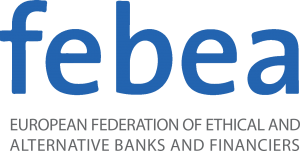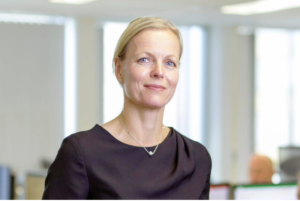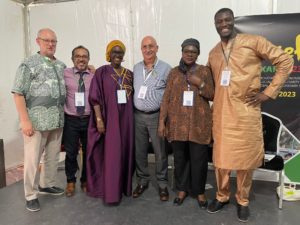- 20 YEARS OF FEBEA. ETHICAL FINANCE IN EVERYONE’S BEST INTEREST.
- FEBEA – 20 YEARS OF ETHICAL FINANCE STORIES IN EUROPE
- FEBEA TOLD BY ITS FOUR PRESIDENTS
- FEBEA’S HISTORY
- THE EVOLUTION OF ETHICAL FINANCE IN EUROPE
- ETHICAL FINANCE: MUCH MORE THAN SUSTAINABLE
- ETHICAL FINANCE EXPERIENCES: CITIZENS MONEY AT THE SERVICE OF SOCIETY
- 20 YEARS IS NOTHING, WHEN IT COMES TO ETHICAL FINANCE
- CRISE SANITAIRE: UN DEFI POUR LA FINANCE ETHIQUE
- HEALTH CRISIS: A CHALLENGE FOR ETHICAL FINANCE
– Read this article in Spanish on Valor Social and in Italian on Valori –
By Sara Garcia Martin
Ethical Finance organizations emerged some 40 years ago in Europe promoted by citizens’ movements that were committed to regain control over the use of their savings and money, to channel it towards the common good. In this sense, the objective of ethical finance is to achieve a positive impact on the collection and use of money, working for the common good and guaranteeing access to credit for cultural, social and environmental projects. But how is this social impact generated? What type of sectors are financed? With which actors does ethical finance work?
Rooted in the territory
Ethical finance entities tend to be deeply rooted in the territory in which they work and in its socioeconomic networks, establishing strong ties with other actors in the social economy such as local associations, social economy companies, entities linked to labor and social insertion, international cooperation entities, etc. For this reason, the set of actions that are financed have to do with projects related to environmental issues (renewable energies, organic farming, energy communities, etc.) and social, understanding social from a broad point of view that includes, for example, not only companies and projects that promote the labor insertion of disadvantaged groups, such as special employment centers, but also initiatives that promote a better society and that include projects with the will to create better jobs, better democratic conditions, artistic projects that promote social values, etc. .
During FEBEA’s 20-year history, the ethical finance entities that have joined the Federation (until reaching the current 33 entities that make up the network) offer experiences of financing, collaboration and support that clearly highlight the values that they inspire the work of ethical finance, leading the way towards a financial system that promotes social equity, responds to environmental urgencies and contributes to a better society.
The Ethical Finance experience in the Thessaly region
The Thessaly region (northeast Greece) is an area with a strong agricultural production, with mountainous areas and valleys, rich in natural resources for energy production. The region has great potential in the biomass supply chain through the agricultural, forestry and wood processing industries that can easily support the adoption of bioenergy technologies. In 2010, the ESEK citizen energy cooperative was created in the area, whose main objective was to promote renewable energies in the region. In 2019, the energy cooperative became an energy community, with more than 400 members, including municipalities, SMEs and local associations and also the Cooperative Bank of Karditsa (Greece), a member of FEBEA and one of the ethical finance entities operating in Europe. The main activity of this Energy Community is related to the management of a biomass plant for the production of solid biofuels to generate energy for heating (or cooling) purposes. The Cooperative Bank of Karditsa is not only a member of the Community but it has financed 100% the creation of the biomass plant and financially supports its operation.
The social impacts of renewable energy
Community energy production has significant potential for Europe, so supporting renewable energy cooperatives means facilitating the energy transition. But beyond that respect for the local environment and the environment, the financial support for this project by the Karditsa Cooperative Bank implies a wide range of social impacts. For example, in the case of ESEK, partnerships with local authorities allow this energy community to expand the supply chain with plant biomass from municipal waste (branches and crowns of city trees). Similarly, community projects can provide flexibility and, when connected to the main power grid, increase the reliability and resilience of the entire system. The participation of residents and local authorities in the projects through the energy communities implies the creation of local investments that, in turn, offer added value to the community since an important part of the performance is maintained and distributed in the local economy. This example of ethical finance involvement takes on special importance given the widespread energy poverty situation and the problem of energy costs in general in Greece.
Banca Etica and Centro Moda Polesano di Stienta
This link with the economy and the local community can also be clearly seen in the support provided by Banca Popolare Etica (Italy) to the cooperative Centro Moda Polesano di Stienta, in the province of Rovigo (northeast Italy), an industrial zone linked to to the textile sector. The great difficulties of the female haute couture sector and the generalized economic crisis of the 2010s forced the local fashion cooperative CAPA to close, leaving 43 working women in the area out of the labor market. In 2018, 22 of those former workers invested their own unemployment benefit to re-create the cooperative, saving not only their own jobs but also creating 11 new ones. The entire process of creating the new cooperative by these workers was carried out with the support of several local actors, including Banca Popolare Etica, which believed in the project and provided a line of credit to guarantee liquidity to the company. This support not only meant saving the jobs of the women entrepreneurs who started the cooperative, but also means supporting the creation of new job opportunities for other women in the area, interconnections created by the cooperative with training schools, revitalization of the local economy, in short, benefit for the territory, in terms of employment, economy and production, with a markedly gender character.
Ethical finance’s commitment to social and solidarity economy
The commitment to financial support to cooperatives, companies and entities linked to the social and solidarity economy is very present within ethical finance entities, as is the case of the support of the credit cooperative CREDAL (Belgium) to the Belgian association Bras dessus Bras dessous. The association arose from a solidarity initiative that sought to reduce the isolation and loneliness of the elderly and give them back the opportunity to participate in society. CREDAL not only contributed its experience to the entity, but also, given the increasing activity of the association in different parts of Belgium, the financial entity granted the association several advance grants so that the organization could continue developing its work. This support means that the project can not only meet the objective of working for the well-being and development of the elderly, breaking loneliness and isolation, but also reinforcing the social dynamics of the neighborhoods where the activity takes place and creating a intergenerational and multicultural social fabric that promotes exchange and sharing.
Beyond economic support
In all the cases mentioned, the support of the financial institutions goes beyond the financial contribution. Entities whose mission is to accompany, monitor and promote entrepreneurial initiatives linked to the social and solidarity economy also participate within FEBEA. In fact, FEBEA is working in Romania to create the first financial instrument dedicated to the social economy, through the AFIN project, funded by the European Union, with the participation of several FEBEA members in the exchange of knowledge. This is the case of the recently incorporated Social Finance Association (SFA), from Romania, which develops a series of educational events for social entrepreneurs in Romania addressing key aspects such as the needs of the social enterprise sector, its maturity, the types of loans available, the difficulties of entrepreneurs and their relationship with banks or the hiring process. Its support to entrepreneurial organizations and individuals helps to attract financial support for these projects. It is also the case of CRESAÇOR- Cooperativa Regional de Economía Solidaria, whose mission is to promote the solidarity economy and local and community development in the Azores Region (Portugal). This second-degree cooperative, which includes a network of 26 associations and social economy entities in the territory, provides technical support and specialized accompaniment to all entrepreneurs who participate in the Azores Bank Microcredit Support Measure microcredit program, promoted by the Regional Government of the Azores. CRESAÇOR analyzes all the applications of the program, deciding the approval of those initiatives that will obtain a microcredit. This small financing facilitates financial and social inclusion, as well as local development, providing well-being to people, which leads to an improvement in the quality of life of the local community.
Microcredit for social inclusion
The microcredit tool is also used internationally by some ethical finance entities that seek financial inclusion by supporting local projects and offering financial services adapted to populations excluded from traditional financial circuits. The French entity SIDI- Solidarité Internationale Pour le Développement et l’Investissement, decided, in the mid-90s, to reorient itself towards supporting microfinance institutions (MFIs), offering them financial collaboration, but also reinforced support to consolidate their technical and improve its governance. Along these lines, in 2011, together with other European investment entities, it created the European Solidarity Financing Fund for Africa (FEFISOL), which has allowed it to increase its support to the rural African world. This Fund offers financial services and technical assistance to African microfinance institutions, mainly rural, and to cooperatives or agricultural companies. Technical support reinforces the financial offer proposed by the fund. FEFISOL loans allow companies to grow their business, while technical knowledge helps them ensure this growth by improving their efficiency.
All these initiatives serve to show how the money of citizens, through ethical finance entities such as those that are part of FEBEA, is put at the service of the common good, supporting social economy projects, creating partnerships and collaboration networks with administrations and local actors, guaranteeing local development while supporting international solidarity.




